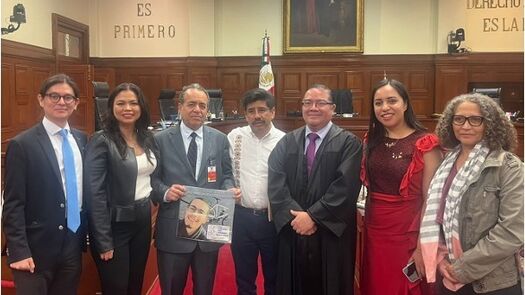December 19, 2025

By Carolina Piñeros Ospina, Executive Director, Red PaPaz
Red PaPaz is one of six civil society organizations (CSOs) in Colombia which Global Health Advocacy Incubator (GHAI) works closely with to help advance road safety policies. GHAI provides strategic support to Red PaPaz through the development of media advocacy campaigns, legal analyses and technical assistance with the goal of reducing road crash-related deaths and injuries within the country.
Colombia, like many countries around the world, has observed a rise in road crashes and fatalities following the COVID-19 pandemic. The increase of individual transportation on four, two and three-wheeled vehicles, combined with speeding and insufficient implementation of the traffic laws contribute to this issue.
In 2022, 8,264 deaths and 37,357 injuries were recorded, the highest rates on record to date. It is likely that by the end of 2023 figures will be even higher. Children are particularly vulnerable on the roads given their physical, cognitive and social development. According to Medicina Legal—Forensic Medicine Authority—(Colombia), in 2022, 218 children under the age of 15 died in road crashes, and another 1,528 required medical attention to treat their injuries, making road crashes the second leading external cause of death among children.
For more than 10 years, Red PaPaz, has worked in political advocacy and social mobilization campaigns focused on protecting children and adolescents’ right to health. In line with this mission and to ensure the safety of children on the roads of Colombia, Red PaPaz is guided by GHAI’s advocacy model and the Global Road Safety Partnership´s technical support. GHAI’s model relies on information gathering, partnership development, citizen and media support mobilization and working directly with decision-makers to advance and strengthen road safety policies. This formula has contributed to other health policy wins in our country, such as the 2021 Ley Comida Chatarra (Junk Food Law) for front-of-package labeling on ultra-processed foods.
As part of a newly formed coalition of CSOs and academics striving for road safety in Colombia, Red PaPaz is advocating for comprehensive road safety policies based on the Safe System Approach to protect children and youth. The Safe System Approach is recommended by the United Nations with the goal of eliminating fatal and serious injuries. It implies a shift in the traditional paradigm that used to put most of the responsibility on the road user, by now considering road safety as the result of a collective responsibility, on which the government must guarantee safe mobility. A safe system includes having safe road users, safe vehicles, safe speeds, safe roads and post-crash care—in an integrated manner.
Safe speeds are the heart of a safe system, as speeding is the main risk factor of serious crashes. Considering this, coalition members strongly advocated for reducing speeds countrywide and contributed to a major victory: the sanction of the Julián Esteban Law in memory of a young cyclist who was run over by a vehicle while training on his bicycle. The law reduced speed limits in urban areas, schools and residential zones and highways, in a manner consistent with the United Nations’ recommendations. However, more than a year after the Law was passed, limited progress has been made regarding its implementation. The coalition is currently playing a citizen oversight role, requesting prompt implementation of it in capital cities where many children walk to school.
In addition to speed limits, Red PaPaz is advocating for a law that will make Child Restraint Systems (CRS) mandatory in Colombia, through bill 142 which recently cleared the Senate and is now under debate in the House of Representatives. CRS use has been proven to reduce serious injuries and fatalities among children by up to 75% in the event of a crash or sudden stop. Currently only 11% of children under the age of two travel in safe child car seats in Colombia. Red PaPaz is also working toward safe and accessible school transportation, especially in rural areas, and the regulation of children being transported on motorcycles, which still has no restrictions at the national level. These are some of the challenges posed by this collective work that we will continue to address, all with the aim of preventing deaths and injuries on our roads.




